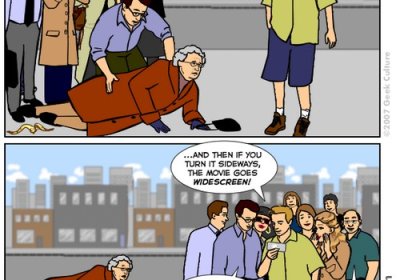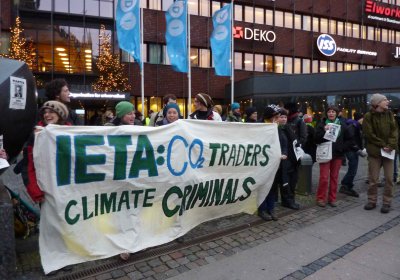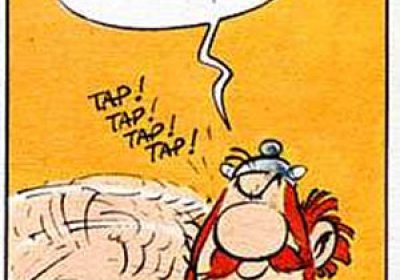“Yes, the notable features with iPhone 4 — both the device and the iOS4 — are mostly tweaks”, said a June 22 review on the popular site BoingBoing.net. “But what tweaks they are.”
In the interests of full disclosure, I’ll admit I have no idea what “iOS4” means. But my eye was caught by the admission that the iPhone 4, launched in Australia on July 29, was almost the same as the iPhone 3.
Corporations use “inbuilt obsolescence” as part of artificially creating markets. This means the products they sell are deliberately made to break down — so we have to keep buying more.
Environment
Protesters had coal trains backed up for kilometres at the small mining town of Collinsville, inland from Bowen, north Queensland, on July 26. They were protesting against the dust and noise of the trains, and the plan to upgrade the rail line to bring up to 70 coal trains a day through their town.
About 15 coal trains a day rumble through the middle of Collinsville. The residents picketed the line for three days, bringing coal train traffic to a complete halt.
The global carbon market, which trades “pollution rights” to encourage industry to cut greenhouse gas emissions, grew in 2009. Far from signaling a success, this reflects a huge increase in fraud, the dumping of surplus emissions permits by industry, and a rise in financial speculation.
Over-fishing threatens caviar
“Lovers of fine food face a shortage of Beluga caviar that may last more than a decade. Eurasian states are discussing a ban on catching sturgeon in the Caspian Sea.
“Over-fishing has reduced the population of the fish that produces the delicacy by 90 per cent.
“It has pushed the price up nearly sevenfold to $14,340 per kilogram, or $1434 for enough to make a sandwich.
“The Caspian Sea is home to four-fifths of the sturgeon bearing the most sought after varieties of caviar ...
On July 17, the Adelaide-based Climate Emergency Action Network (CLEAN SA) hosted a forum in Port Augusta detailing the Zero Carbon Australia 2020 Stationary Energy Plan recently launched by Beyond Zero Emissions (BZE).
“What the hell did we do to deserve this?”, BP CEO Tony Hayward asked fellow executives in the company’s London office, days after the April 20 explosion of the Deepwater Horizon oil rig in the Gulf of Mexico, the April 29 New York Times said.
Eleven workers died in the explosion that has generated the US’s worst ever environmental disaster.
BP finally managed to place a cap over the well on July 15, although its status remains tenuous. Associated Press reported seepage detected from the cap on July 21.
Two recent reports, released by NASA and the US National Climate Data Centre, have confirmed that last month was the warmest June since records began.
June was the fourth consecutive month that had broken temperature records, the US National Oceanic and Atmospheric Administration (NOAA) said. Global monthly records were also broken in March, April and May.
June was the 304th month in a row that recorded a global average temperature higher than the 20th century average. February 1985 was the last month temperatures fell below the average.
“The poisoning of groundwater near Kingaroy is just the tip of the iceberg with coal seam gas [CSG] extraction”, climate change activist and Socialist Alliance candidate for the seat of Brisbane Ewan Saunders told Green Left Weekly.
The contamination of groundwater by toxic chemicals was revealed two weeks ago, sparking calls for urgent action against the CSG industry, which is rapidly expanding in south-eastern Queensland.
A draft program for the Climate Change Social Change conference, over November 5-7, has been released and is available on the conference website.
Major conference sessions include topics such as: “A safe climate — what will it take?”; “Climate justice: their agenda and ours”; “Food sovereignty for surviva”l; and “The global economic crisis and the ecological revolution”.
Forget about the climate science and the record high temperatures. Prime Minister Julia Gillard has decided she doesn’t need a serious climate change policy to win the federal election.
In its place, she kicked off her election campaign on July 18 with a “sustainable Australia” policy. It promised a future of low population growth, which “preserves our quality of life and respects our environment”.
Opposition leader and climate denier Tony Abbott was quick to say he fully agreed with this vision, but was even more committed to it than Gillard.
The Order of Mates celebrated beside Sydney Harbour the other day. This is a venerable masonry in Australian political life that unites the Labor Party with the rich elite known as the big end of town.
They shake hands, not hug, though the Silver Bodgie now hugs. In his prime, the Silver Bodgie, aka Bob Hawke or Hawkie, wore suits that shone, wide-bottomed trousers and shirts with the buttons undone.
A bodgie was an Australian version of the 1950s English Teddy Boy and Hawke’s thick grey-black coiffure added inches to his abbreviated stature.
This election campaign is crazy.
It’s crazy that so much fear is being whipped up about the few thousand of the world's 43 million refugees and displaced people who manage to get on a leaky boat to Australia.
But neither mainstream party is willing to stop sending troops to the decade-long military occupation of Afghanistan. This war is largely responsible for 2.8 million Afghan refugees worldwide — the same war is opposed by most in Afghanistan and most citizens of the countries whose armies occupy it.
- Previous page
- Page 284
- Next page









